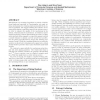13 search results - page 2 / 3 » Enhancing Privacy with Shared Pseudo Random Sequences |
CTRSA
2009
Springer
14 years 2 months ago
2009
Springer
Abstract. A redactable signature scheme for a string of objects supports verification even if multiple substrings are removed from the original string. It is important that the re...
SOUPS
2009
ACM
14 years 1 months ago
2009
ACM
Randomness is a necessary ingredient in various computational tasks and especially in Cryptography, yet many existing mechanisms for obtaining randomness suffer from numerous pro...
PERCOM
2009
ACM
14 years 2 months ago
2009
ACM
—Privacy protection is increasingly important during authentications in Radio Frequency Identification (RFID) systems. In order to achieve high-speed authentication in largescale...
ACSAC
2006
IEEE
14 years 1 months ago
2006
IEEE
Information leakage through covert channels and side channels is becoming a serious problem, especially when these are enhanced by modern processor architecture features. We show ...
ACSAC
2010
IEEE
13 years 5 months ago
2010
IEEE
Spread spectrum techniques such as Direct Sequence Spread Spectrum (DSSS) and Frequency Hopping (FH) have been commonly used for anti-jamming wireless communication. However, trad...

